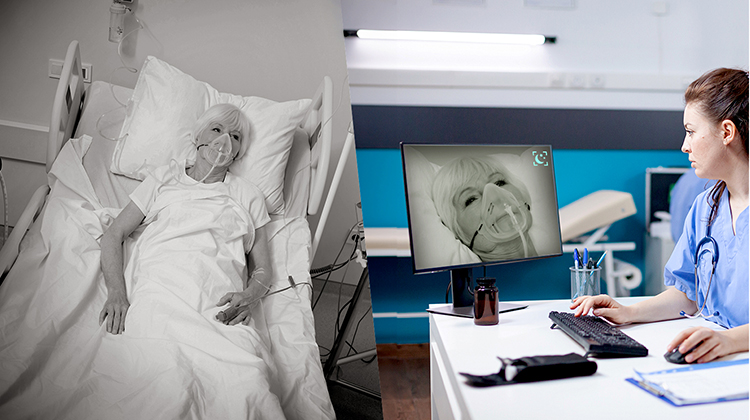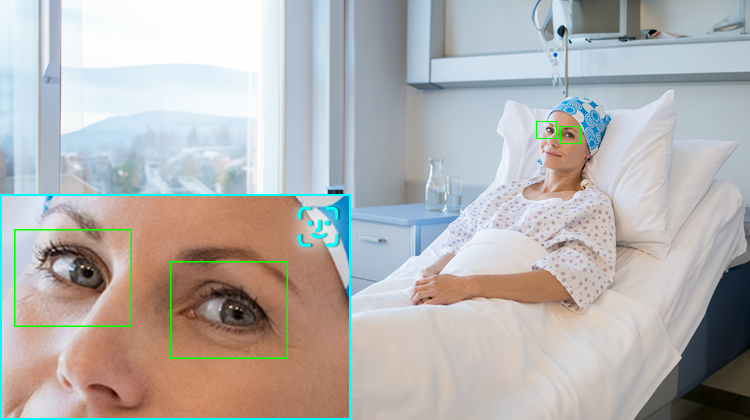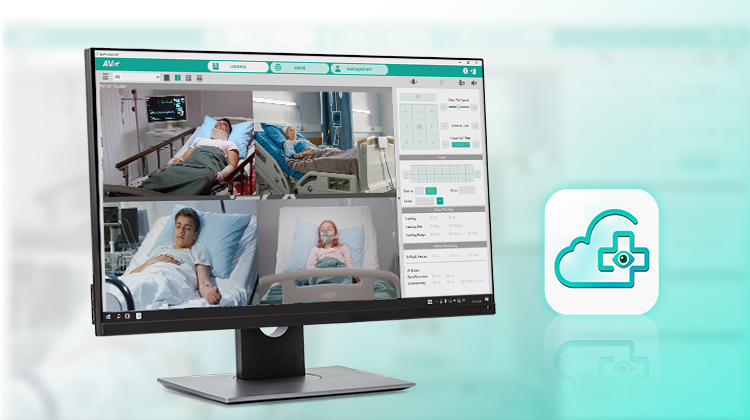In recent years, hospitals and nursing homes have been having a hard time caring for patients and residents due to limited caregivers. With this problem in mind, AVer has been dedicated to creating with our capabilities a tool to enable healthcare professionals to achieve better patient care, hence the birth of the MD120UI, the first medical-grade PTZ camera designed for telesitting.
In this article, we interviewed AVer product manager Andrew Lee on the newly launched MD120UI, delving into the intricacies of the device and exploring its capabilities, benefits, and the profound impact it promises to have on healthcare facilities worldwide.
Q: Could you tell us what specifically inspired the creation of the MD120UI?
A: In the medical world, currently there are a few major issues encountered by healthcare professionals.
First off, the global population is getting older. More elderly people need care, yet there are limited people who can provide that care, whether it’s in nursing homes or hospitals. This brings us to another important issue—the global nursing shortage. Especially after COVID, people are reluctant to pursue nursing as a career, so those already working as nurses are encountering more work and longer hours, often leading to high burnout rates that exacerbate the problem. If the problem continues at the current trajectory, the US will have a shortage of 13 million nurses by 2030. The situation has worsened to the point that many hospitals are resorting to reducing inpatient capacity to lessen the strain on their nurses, even though there are more people who need care.
We realized that health workers spend much of their time doing rounds to check on patients, and with our camera capabilities, we saw that we could create value by letting them check on their patients remotely. If we combined high-quality imaging technology, providing medical practitioners instant access to any patient from the nursing station or even on their mobile devices, we could help alleviate a lot of pressure on hospitals. So that’s why the MD120UI was created.
Q: Could you briefly introduce us to the MD120UI and its main advantages?

A: The MD120UI is the first medical grade PTZ camera designed for telesitting. In recent years, hospitals have been focusing on integrating medical data into nursing station systems, so that nurses can monitor the vital signs of many patients at the same time. Now, nursing stations are shifting focus to incorporating video as well, because many conditions aren’t obvious when monitoring data but are clear as night and day when you see the patients in real-time. Products on the market currently, like security cameras, don’t generate high-quality imaging, but the MD120UI offers exceptional imaging capabilities with a great zoom lens and AI eye tracking functionality.
The MD120UI also supports PoE+, which means it can receive power over Ethernet. Rather than a mess of cables coming out from behind the device, PoE+ allows hospitals to have the MD120UI up and running with only one Ethernet cable, simplifying setup and lower the cost for installation significantly.
Before the launch of our medical grade cameras, we always have actual hospitals test out our products to ensure proper product functionality and satisfaction of the medical practitioners. By the time we launch our medical grade cameras, the products will have undergone meticulous testing and review by the hospital staff, they are the reason why we can keep offering top-of-the-line cameras with patient-centered design.
Q: We heard that this model's AI features are impressive. Could you tell us more about what the MD120UI can do?

A: Straight out of the box, the MD120UI has built-in AI eye-tracking capability. The reason for developing this is after speaking with doctors and nurses, we learned that observing patients’ eyes can help detect signs of early stroke and other neurodegenerative disorders. The MD120UI has 20X Zoom capability, allowing doctors and nurses to examine patients’ eyes with extreme clarity from the nursing station or even from their mobile phones, with this tracking function, observing patients and assessing their conditions remotely can be much easier and quicker.
Other AI functionalities currently under development include AI Alert detection and Fall/Egress detection. The former is for health practitioners to be immediately alerted if an alarm in a patient ward goes off. Fall Detection is for ensuring patients who accidentally fall off their beds to receive immediate help while Egress Detection is for patients who attempt to escape the ward, particularly useful for monitoring elderly patients, dementia patients, or even suicidal patients. Elderly patients often want to leave the hospital and go home, while dementia patients cannot remember why they are in the hospital and simply attempt to leave. By detecting when patients fall off their bed or leave their bed, we can help prevent patients from accidental harm, preserving the health and safety of the patients.
Q: How did the team manage to develop the AI features? Did you encounter any issues in the development process?
A: In the development of eye tracking, we encountered some problems at first in identifying people with beards and people with masks on at first. In the beginning, our system would not be able to recognize faces with beards and masks as a face, and we had to teach our AI what faces with beards and masks looked like. After showing our system a larger database of images with bearded and masked people, our AI improved significantly and now has no problem with identifying the eyes of bearded or masked people, even in dark rooms using the camera's infrared sensor.
Q: What software is the MD120UI compatible with?

A: If your hospital has a designated electronic health record (EHR) system, the MD120UI is compatible and can be easily integrated into most EHR systems, and we have established partnerships with many of the largest EHR vendors.
If your hospital does not utilize a specific EHR system, we created AVer Viewcare just for you. It is a basic software designed for hospitals that need an intuitive, easy-to-use system to manage their AVer cameras. One of the hospitals that has adopted AVer Viewcare gives us positive reviews of the system and tells us that it has all the necessary controls for a hospital that doesn’t integrate its camera system with its EHR systems. Viewcare will also be updated when we release new functions to cameras.
Also worth mentioning is that the MD120UI can be accessed through the PTZ Control Panel app for iPads or iPhones in the hospital, which is particularly useful when nurses or doctors are on the move but still need to check on specific patients.
Q: Is there anything else that you’d like to tell people about the MD120UI?
A: I’d like to reiterate that the MD120UI is a groundbreaking medical grade PTZ camera, emerging as a transformative solution for the pressing challenges faced by healthcare facilities worldwide. With an aging population and a shortage of healthcare providers, patient care has never been more demanding. The MD120UI addresses these concerns head-on, offering healthcare professionals a powerful tool to remotely monitor patients with exceptional imaging capabilities, AI features like eye tracking, and crucial functionalities like AI Alert Tracking and Fall Detection. AVer's commitment to innovation shines through in this device, complemented by the user-friendly AVer Viewcare software, ensuring that healthcare facilities can adapt and thrive in the ever-evolving landscape of modern healthcare. We are confident that the MD120UI will bring progress and promise of a brighter future for patient care worldwide.